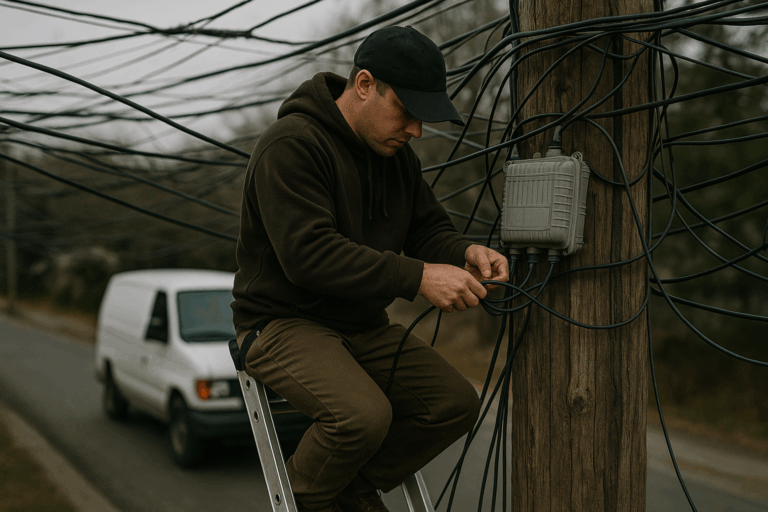Will Elon Musk Shut Down Local OTA TV?
If you’ve been cheering for Elon Musk to bring his “less people, more robots” philosophy to the government—and maybe replace DMV clerks with AI-powered kiosks—you might want to pause and ask: What does Musk’s new role mean for something near and dear to your cord-cutting heart? We’re talking about local TV broadcasting and internet services, both tightly controlled by the FCC (Federal Communications Commission).
With Musk stepping into a cozy new government role under the incoming Trump administration—alongside a newly appointed FCC chair who’s practically waving pom-poms for deregulation—we’ve got a potential for problems that not even Houston can fix. And take a moment and enjoy the irony here. Creating more government to shrink government. That’s equivalent to building a bigger closet to hide the clutter.
Musk, Mars, and the FCC
First, let’s set the stage. Elon Musk has been appointed by President-elect Donald Trump to co-lead the newly established Department of Government Efficiency, a role tailor-made for someone who thinks bureaucracy is just a slower way to solve problems. Musk will share the spotlight with Vivek Ramaswamy, a businessman and self-proclaimed government disrupter, in an effort to shrink government, cut red tape, and make everything run like Tesla’s Gigafactories—minus the factory fires (we hope). During his campaign, Ramaswamy chimed in on X with his signature catchphrase calling for the shutdown of federal agencies, declaring: “SHUT IT DOWN.” (Business Insider) (CNN)
The FCC, the agency that controls local TV broadcasting, internet regulations, cell signals, Wi-Fi, and your doorbell’s wireless signal, and even all radio frequencies (RF) Musk uses to beam down Starlink internet, is now under the leadership of Brendan Carr. If that name rings a bell, it’s because Carr has been an FCC commissioner since 2017, and he’s also known for loving deregulation almost as much as Musk loves reusable rockets. (Politico)
Carr got promoted to Chairman and will take over from Acting Chairwoman Jessica Rosenworcel, a staunch advocate for net neutrality and champion of local broadcasters. Her departure on January 20, 2025, signals a major shift in FCC priorities, with Carr expected to focus on reducing rules for big telecom players and streamlining approval processes for emerging technologies like—oh, would you look at that—Starlink satellites and satellite-powered cell service. Convenient, huh? (El País)
What Does This Mean for Local TV Broadcasting?
Local TV stations, like West Michigan’s WZZM13, WWMT, and WoodTV8, depend on the FCC to allocate and protect the RF spectrum they use to broadcast over the air. Without the FCC keeping things orderly, the airwaves would be like a rush-hour traffic jam, with satellites, cell signals, and broadcasters fighting for space.
Here’s where it gets dicey: Musk’s Starlink satellites, his new satellite-powered cell service, and even SpaceX rockets all rely on RF to function. And with Brendan Carr leading the FCC, the push for deregulation could prioritize satellite communications over terrestrial broadcasters. In plain English? Your favorite TV channels might get pushed further down the spectrum—or squeezed out entirely. (The Verge)
Stay Informed?
A Little Background on RF: Why It’s Musk’s Bread and Butter
RF, or radio frequencies, are the invisible waves that make modern life possible. Local broadcasters use it to beam free TV into your home, while Starlink and cell towers use it to send data across the globe. Even Musk’s rockets use RF to communicate with Earth and keep the Mars dream alive.
Here’s something to consider: The FCC controls how RF is allocated, which means Musk’s shiny satellites and your trusty TV channels are all vying for space on the same invisible highway. With Carr in charge, expect the FCC to favor innovative tech (read: satellites) over “old-school” broadcasting, potentially shrinking the slice of RF pie reserved for local stations. (The Verge)
What About Starlink’s Role in All This?
Starlink, Musk’s satellite internet service, has been a game-changer for rural broadband. It uses high-frequency RF bands to beam internet from space, helping people in underserved areas access the web. But it’s also received hefty government subsidies to do so—because what’s a billionaire’s empire without a little taxpayer help, right? (Benzinga)
Now, as Musk steps into his government role, Starlink’s success is more closely tied to FCC policies than ever. If the agency fast-tracks spectrum reallocations to benefit satellite services, local broadcasters could find themselves playing second fiddle to Musk’s space-age ambitions. (The Verge)
How This Affects West Michigan Cord-Cutters
Let’s bring it back down to Earth—specifically, West Michigan, but not limited to. Here’s what all this could mean for everyone living in the United States:
-
Channel Availability: If the FCC reallocates more RF to satellite services, local stations could be forced to shift frequencies. That means more rescans for you, and potentially fewer channels overall. This would come at a time when local antenna broadcasting is at its historical peak for cord-cutters who already made the switch. 22.75 million people currently use an antenna in the U.S. (Nielsen)
-
Signal Interference: With more RF traffic coming from satellites and Starlink-powered cell service, over-the-air broadcasts could face more interference. While broadcasters will do their best to adapt, it might not always be a smooth ride.
-
ATSC 3.0 to the Rescue?: Many local stations are adopting ATSC 3.0, the next-gen broadcasting standard that offers better signal quality, mobile compatibility, and interactive features. Check if your TV is ATSC 3.0-ready to stay ahead of the game.
-
Internet Competition: On the flip side, Starlink’s expansion could bring faster, more reliable internet to rural areas. That’s a win for many, but it could also tilt the balance away from free, over-the-air TV as more people turn to streaming.
Musk’s Long Game: Mars, RF, and Government Efficiency
Let’s not forget: Musk’s ultimate goal isn’t just better internet or deregulated airwaves—it’s Mars. Every dollar Starlink generates (from you, rural subscribers, and those juicy government grants) is helping fund SpaceX’s mission to send humans to the Red Planet.
Musk can’t afford chaos on the RF spectrum; it’s the backbone of his entire operation. That means he’ll tread carefully to keep the FCC functional enough to protect the RF he needs. But local broadcasters? They might not be as high on his priority list. So, don’t expect PBS to be a local broadcast on the red planet. But let’s hope it remains broadcasting here on Earth.
How to Stay Prepared
-
Rescan Occasionally: As local stations shift frequencies to make room for new RF demands, keep your antenna setup up-to-date by rescanning for channels periodically. If you have not rescanned in the last year, now is a good time to do so.
-
Keep an Eye on Starlink: If you live in a rural area, Starlink might be a great internet option—but don’t let it replace your free TV setup just yet. You still need an antenna to get local broadcasting and national networks like ABC, NBC, CBS, FOX, and PBS, to name a few.
Final Thoughts: Is Local TV Safe?
While Musk is unlikely to “shut down” the FCC, his influence over RF and deregulation could have big implications for local TV broadcasting. His ambitions are geared toward getting boots on Martian ground. He needs FCC regulation to work in his favor so he can keep his radio transmissions intact with his rocketry and crew. But he may not care much about local broadcasting. If he proposes a streamlined restructure to shut down local broadcast towers, and run it all through his Starlink service as he is currently testing with satellite-to-cell phones, then we’re all at risk for being slaves to the megastructure Musk is creating. Imagine one single person having full control of not just the internet, but your cell phone and TV broadcasting. Is Musk positioning himself to push out all competition? Who’s to say just yet? For now, West Michigan stations are holding their own, but the game is changing fast.
In a recent statement, President-elect Donald Trump, while giving a big thumbs-up to his new FCC Chairman Brendan Carr, said, “He (Brendan Carr) will end the regulatory onslaught that has been crippling America’s Job Creators and Innovators, and ensure that the FCC delivers for rural America.” Now, here’s the question: Is Trump talking about fixing the painfully slow internet in rural areas, removing obstacles in Musk’s way, or doubling down on the OTA broadcasts that helped bring his rural voters to the polls? Perhaps they all should tread lightly. After all, they wouldn’t want to bite the hand(s) that feeds them, would they?
Stay tuned, stay informed, and as always, keep your antennas pointed to the skies. You never know what’s coming next—whether it’s your favorite channel or Musk’s latest Mars mission. 🚀






1 thought on “Will Elon Musk Shut Down the FCC—or Local OTA TV Broadcasts?”
Musk could definitely push for sweeping changes, especially with the right allies in power like a friendly FCC Chairperson. His influence and resources might fast-track tech-focused deregulation, potentially targeting systems like OTA broadcasting. Although Musk might see OTA as outdated, 23 million people would call it proven.
He’d face a wall of resistance from broadcasters, lawmakers, and millions of consumers who still rely on these services. Even with insider connections, the FCC operates under public scrutiny, legal frameworks, and Congressional oversight. Musk and his buddies might shake things up, but tearing down the system won’t come easy.
I can, however, see him and his associated parties removing any barriers that would slow down his goal of making it to Mars within two years. If anything, he’ll coordinate everything in that direction.